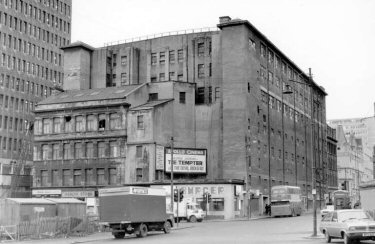The Green's Playhouse

The flicks, the dancin' , the MP and all that jazz!
The Green brothers, Bert and Fred, had the idea of building a huge cinema at the top of Renfield Street, Glasgow, in the 1920s. The Playhouse was built by the Cinema Building Company and was opened on the 15th September 1927 when, following a grand opening, the film “Play Safe” starring Monty Banks was shown to over 4,000 of Glasgow’s eager cinema patrons.
During these early days the cinema, ballroom, cafes and vestibules could cater for 10,000 people; incredible even by the standards of today’s multiplexes. The Green’s introduced the “talkies” to Glasgow and with its leading edge technology, dancing girls and first class cuisine; it all but dominated the Glasgow social scene for many years.
It was normal at the time for whole families to go to the “pictures” together on a regular basis. The story goes that after the outbreak of war everyone used a torch to get there through the blackout. Paints an evocative picture of 4,000 people with torches marching up Renfield Street.
In addition to the city’s fondness for cinema, the Green brothers also capitalised on the dance craze gripping the country at the time, by including the Green’s Playhouse ballroom in their plans. The opening of the ballroom brought the number of dancehalls in Glasgow to almost 160.
Perched on top of the cinema, the ballroom could hold 1,500 dancers. The ballroom was particularly successful during the 1940s when it hosted several of the top dance bands of the time including Joe Loss and his orchestra and Oscar Rabin.
Pete King, Club Director at Ronnie Scott’s Club in London, writes on his website, “I also remember a season there with Ronnie Scott's Big Band and we were playing the obligatory set of waltzes with Ronnie 'conducting', when a couple came close to the stand and the male, a particularly rough-looking gentleman with a scar across his face, growled, 'Ye playing it too fast, slow it doon.'
Ronnie took one look at this character and very sensibly reduced the tempo immediately.” The Glasgow crowd’s legendary “attitude” was alive and well even in those days!
In his book " We Want U In", Charles A Harkins recalls how the Playhouse was almost burnt down in 1953 when fire destroyed the adjacent Lyric Theatre. The theatre was saved by the Glasgow Fire Service who acted in time to limit the damage to broken windows and some water damage.
In 1963 Harold Wilson had to think of something concrete to say when he was addressing a rally at the Playhouse. Thinking on his feet he came up with the idea that was to become the Open University. Rumour has it he was inspired by the Glasgow audience; either that or he was trying to impress a particular Ronnie Scott fan.
"If you don't mind me saying so: that was f***ing murder. "
Member of audience to Tony Mansell after hearing him sing in Green's Playhouse, Glasgow